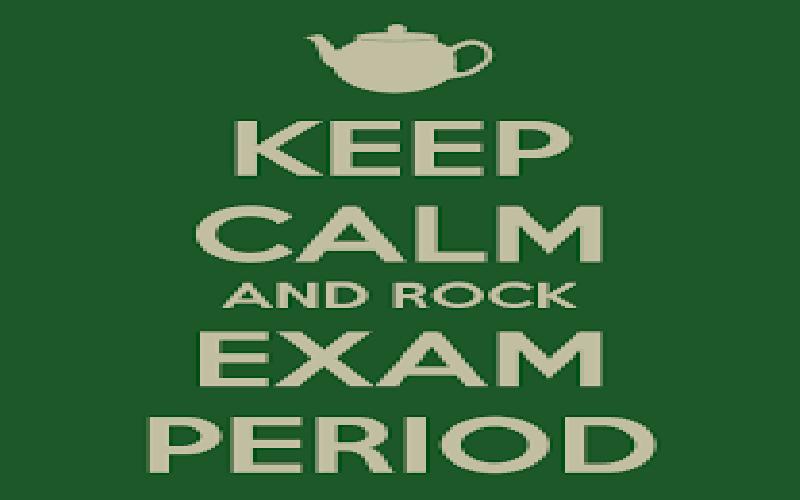Follow These Tips to Study During Exams and Succeed

Image Source - https://www.keepcalm-o-matic.co.uk/p/keep-calm-and-rock-exam-period/
Exams should always be remembered for right reasons. While one prepares by giving their all, exams should bring in more to a person. A successful result is an inevitable part of expectation but exams are also a way to enhance one's goal setting, time management, stress management and group learning skills.
We all fear exams, don’t we? Somewhere amidst all the anxiety, stress and prolonged hours of staying up, undeniably, we have to attribute a significant part of our learning and growth to the experience around exams. Exams teach us to compete (with ourselves and on a healthy level, with our counterparts too), evaluate our timely progress and level of understanding and thus more often than not become the deciding factor for future steps in career enhancement. Exams play a pivotal role in training our minds and bodies on a host of life lessons including but not limited to discipline, focus, patience, hard and smart work and a result oriented approach.
There is no straight forward strategy to doing great in the exams. It invariably depends on an individual and a particular context. Positive result too, is a reflection of one’s expectation and persistence in proportion to the expected outcome.
Some tested and proven measures come very handy in order that one is successful.
Not in any particular order, the best methods to ensure a happy exam journey are listed below.
- Healthy mind: No matter how much pressure the thought of exams nearing brings to us, it is very important to relax. A stressed mind can never concentrate and produce quality work.About 10 minutes of simple meditation everyday helps a great deal. One that I am aware of and encourage students to practice is, to sit in a quiet place with fresh air around, preferably on a mat on the floor with a gyan mudra symbol. Close eyes and concentrate on breathing. Let the thoughts flow in and out. Work to bring the focus back on breath.
- Nutrition and optimum sleep: Eating healthy food comprising of fruits and vegetables is vital. Strictly avoid greasy and heavy dishes. Refrain from eating outdoors and experimenting. One should stick to homemade food as much as is possible (familiarity to the bodies’ needs works wonders) and in take lots of liquids like water and fruit juices. Compromising too much on food and especially so sleep results in mental and physical fatigue. This is clearly undesirable during the exam period.
- SMART goals: No matter how much one has worked all along the period of study, the duration revolving around the exams is crucial in every sense of word. Be it studying from books/websites/tutorial materials/group discussions et all, having concise SMART goals is imperative. SMART – Specific Measurable Achievable Realistic Time- bound. Every small and big goal must be specific and detailed; suitable to measure progress/success/failure against key parameters; achievable keeping in view one’s abilities, limitations and core skill sets; realistic without overlooking track record and general conditions and restrictions to realise the goal; time bound so as to have a deadline to accomplish the planned task.
- Important Vs Urgent Tasks: Time management goes a long way in influencing the extent that we can succeed. There can always be “little more important “tasks than the one at hand. On regular basis be it daily/weekly/monthly/yearly, one should have a priority list of tasks. The 4 quadrants to represent it are – Important and Not Urgent, Important and Urgent, Not important and Not Urgent, Not Important and Urgent. One may wisely conclude these after meticulous planning and personal supervision coupled with valuable suggestions from a mentor – a parent/ guide/teacher/sibling etc. After all, having an inspiring mentor is one of the keys to meeting fruition.
- SWOT: Self-awareness is mandatory for best results. One must be a potential judge in assessing one’s own Strengths, Weaknesses, Opportunities, Threats in relation to various subjects and modules in an exam. This can benefit constructive division of time and energy to the right areas. Analysis of over few weeks or even months can thus aid in the exam period with a well-directed approach. An exam is really a route to competing with oneself and being better than before.
- Practice Practice and More Practice: Instead of merely reading, studying and revising, creating a mock exam scenario and participating in it is a huge deal breaker. With like-minded individuals around, it makes a world of a difference because there is so much more infectious enthusiasm and a platform to explore diverse possibilities of doing things faster and better, avoiding mistakes and errors, and the luxury of not getting bored at all. Laying hands on sample questionnaire and past experiences of other candidates is an added advantage for any kind of exam.
- How much is too much: Whilst it is good to utilise every moment prior to the exam, it is mandatory to know when to stop. A few weeks running up to the exam period has to be well taken care of. Stretching oneself too much is perfectly fine, but towards the fag- end of exam study period, it is important to keep it balanced. One must avoid fretting over learning entirely new concepts or lessons that are hitherto unheard of. One must stop comparing one’s learning with others. There is every tendency that such comparisons lead to forgetting the most important tasks at hand. In fact, having simple easy-to-comprehend notes and well prepared easy –to- use manual should be the guide in the entire exam period, not really huge books. Seeking motivation from all corners is fantastic, but being led blindly and getting profusely carried away by what others think and say will only cause more stress. Be strong and independent.
Exams should never be looked at as a “do or die “. Of course, seriousness cannot be undermined. End result should not go for a toss. And but naturally one must be ambitious. At the end of the day, the process and journey of an exam should seem memorable to look back, at a later point in time, for inspiration and for strength. It should be something of an achievement that one is proud to weave stories about and share with all.
Let us know how you like this article. Like it and Rate it below.
286
1
2
Thanks for rating this article
4.5 stars - by
2 user(s)

I am a project manager by profession and a passionate trainer for Soft Skills, English Communication, NLP.
I love travelling and have been to over 20 countries which has expanded my knowledge, enhanced my cultural competence and made me an independent and a stronger person.
I especially enjoy teaching, counselling and mentoring; writing about people and experiences.
Related Articles
1.29K
The article contains the list of various exams which a graduate student can give to grab a job in government sector companies. These include GATE (Graduate Aptitude Test in Engineering), ESE (Engineering Services Exams), IAS (Indian Administrative Services), CDS (Combined Defense Services) and SSC (Staff Selection Commission) Exams.
.
1.81K
How to pass ICWAI foundation exam, is topic of today; which will be elaborated in rest of this article; just keep on reading...
3.59K
Do you know what to say when you are asked about your bad grades during a job interview? This article mainly focuses on how to explain your bad grades in a job interview. Hope that the content will be useful for you..

